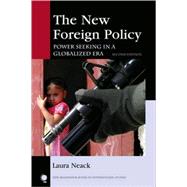
| Preface | p. xi |
| Introduction: The New Foreign Policy | p. 1 |
| A Tangled Tale of Tibet | p. 1 |
| The New Foreign Policy | p. 6 |
| Defining the Subject: Foreign Policy | p. 9 |
| Selecting Entrance Points: Levels of Analysis | p. 10 |
| Worldviews and Theories | p. 12 |
| Realism | p. 14 |
| Liberalism | p. 15 |
| Marxism | p. 16 |
| Constructivism | p. 19 |
| The Bridge between International and Comparative Politics | p. 19 |
| A New Millennium | p. 25 |
| Chapter Review | p. 26 |
| Rational Actors and the National Interests | p. 29 |
| The Definition of "Leaders," Part One | p. 29 |
| The Rational Actor Model | p. 31 |
| Rationality, Deterrence, and "Irrationality" | p. 39 |
| Poliheuristic Theory: A Bridge to the Next Chapter? | p. 43 |
| Chapter Review | p. 45 |
| Cognitive Misers and Distrusting Leaders | p. 47 |
| The Definition of "Leaders," Part Two | p. 47 |
| Cognition: A Different View of Rationality | p. 51 |
| Belief Sets and Cognitive Structure | p. 53 |
| Operational Code | p. 60 |
| Personality | p. 62 |
| Chapter Review | p. 64 |
| Decision Units, Small Groups, and Bureaucratic Politics | p. 65 |
| The Decision Units Framework | p. 65 |
| Predominant Leader | p. 67 |
| Single Groups and the Groupthink Syndrome | p. 67 |
| Who Makes Foreign Policy Decisions for Iran? | p. 71 |
| Multiple Autonomous Actors and Bureaucratic Politics | p. 75 |
| Chapter Review | p. 79 |
| National Self-Image, Culture, and Domestic Institutions | p. 81 |
| Similar Countries but Different Foreign Policies? | p. 81 |
| Rosenau's Ideal Nation-Types | p. 84 |
| National Self-Image | p. 86 |
| Culture and Institutions of Governance | p. 90 |
| Culture, Institutions, and the Democratic Peace | p. 92 |
| Chapter Review | p. 94 |
| Domestic Politics | p. 95 |
| Considering Government Type and Process | p. 95 |
| Domestic Politics: The Critical Side of the Nested Game | p. 98 |
| Accommodate, Insulate, or Mobilize | p. 99 |
| Democratization and War | p. 103 |
| Chapter Review | p. 109 |
| Public Opinion and Media | p. 111 |
| Public Opinion Matters-But How? | p. 112 |
| Different Views on the Public | p. 114 |
| Public Opinion in Nondemocracies and Democracies | p. 116 |
| Public Opinion and the "CNN Effect" | p. 121 |
| A Complicated Relationship: Government, Elite, Media, and the Public | p. 125 |
| Chapter Review | p. 128 |
| Great Powers | p. 129 |
| Position and Power | p. 129 |
| The Elusive Concept of Power | p. 133 |
| Who Gets to Be a Great Power? | p. 136 |
| What Do Great Powers Do? | p. 139 |
| The Unique Position of the United States | p. 143 |
| American Foreign Policy under George W. Bush | p. 147 |
| Chapter Review | p. 152 |
| The Other Powers | p. 153 |
| Penetrated Systems | p. 154 |
| Rising Great Powers | p. 155 |
| Secondary Powers | p. 157 |
| What Kind of Power Is the European Union? | p. 159 |
| Middle Powers and Good International Citizens | p. 161 |
| Small Powers and Client States | p. 164 |
| Chapter Review | p. 171 |
| Conclusion: A Nested Game with Many Players | p. 173 |
| A Tangled Tale of Pincohet | p. 173 |
| Between Domestic and International Politics in an Era of Globalization | p. 179 |
| Nonstate Actors on the Rise | p. 181 |
| Concluding Thoughts and a Message to Those in Power | p. 187 |
| Notes | p. 191 |
| Glossary | p. 211 |
| Index | p. 219 |
| About the Author | p. 233 |
| Table of Contents provided by Ingram. All Rights Reserved. |
The New copy of this book will include any supplemental materials advertised. Please check the title of the book to determine if it should include any access cards, study guides, lab manuals, CDs, etc.
The Used, Rental and eBook copies of this book are not guaranteed to include any supplemental materials. Typically, only the book itself is included. This is true even if the title states it includes any access cards, study guides, lab manuals, CDs, etc.